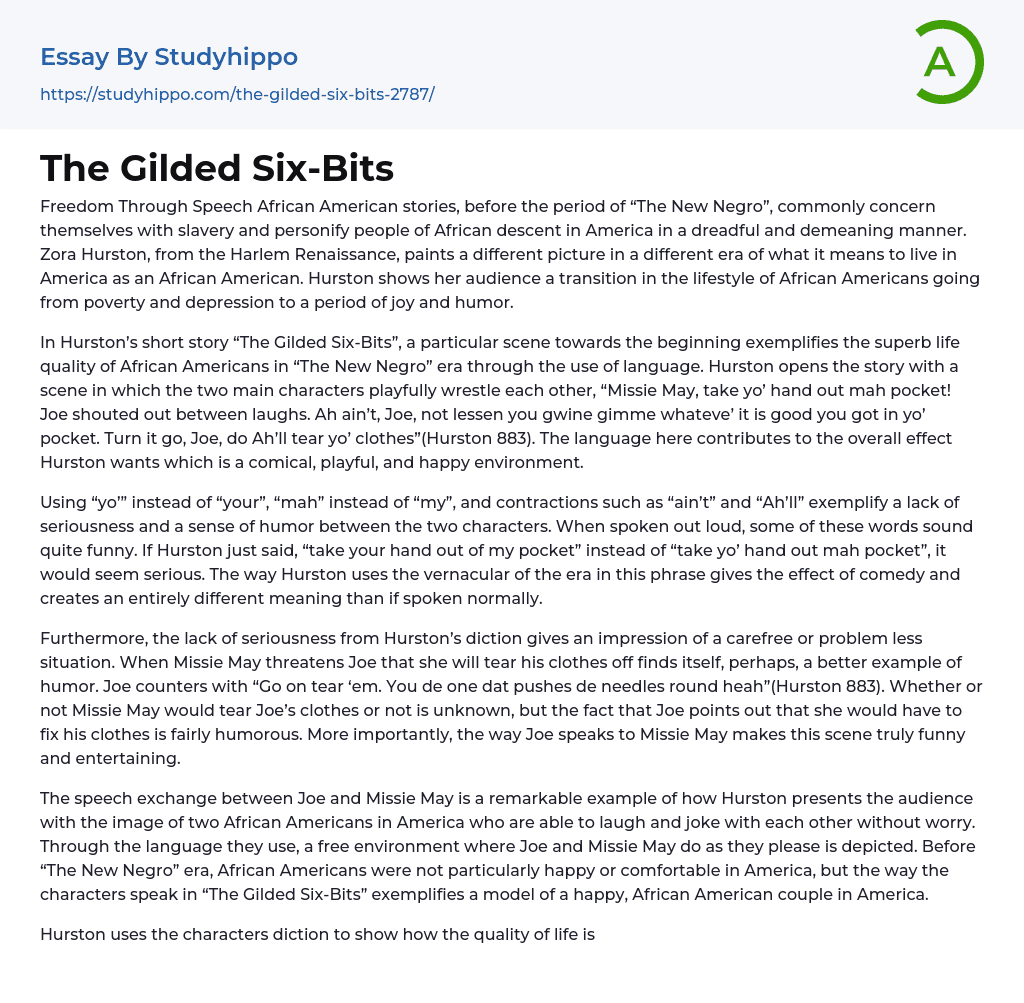Freedom Through Speech African American stories, before the period of “The New Negro”, commonly concern themselves with slavery and personify people of African descent in America in a dreadful and demeaning manner. Zora Hurston, from the Harlem Renaissance, paints a different picture in a different era of what it means to live in America as an African American. Hurston shows her audience a transition in the lifestyle of African Americans going from poverty and depression to a period of joy and humor.
In Hurston’s short story “The Gilded Six-Bits”, a particular scene towards the beginning exemplifies the superb life quality of African Americans in “The New Negro” era through the use of language. Hurston opens the story with a scene in which the two main characters playfully wrestle each other, “Missie May, take yo’ hand out m
...ah pocket! Joe shouted out between laughs. Ah ain’t, Joe, not lessen you gwine gimme whateve’ it is good you got in yo’ pocket. Turn it go, Joe, do Ah’ll tear yo’ clothes”(Hurston 883). The language here contributes to the overall effect Hurston wants which is a comical, playful, and happy environment.
Using “yo’” instead of “your”, “mah” instead of “my”, and contractions such as “ain’t” and “Ah’ll” exemplify a lack of seriousness and a sense of humor between the two characters. When spoken out loud, some of these words sound quite funny. If Hurston just said, “take your hand out of my pocket” instead of “take yo’ hand out mah pocket”, it would seem serious. The way Hurston uses the vernacular of the era in this phrase gives the effect of comedy and creates an entirely different meaning than if
spoken normally.
Furthermore, the lack of seriousness from Hurston’s diction gives an impression of a carefree or problem less situation. When Missie May threatens Joe that she will tear his clothes off finds itself, perhaps, a better example of humor. Joe counters with “Go on tear ‘em. You de one dat pushes de needles round heah”(Hurston 883). Whether or not Missie May would tear Joe’s clothes or not is unknown, but the fact that Joe points out that she would have to fix his clothes is fairly humorous. More importantly, the way Joe speaks to Missie May makes this scene truly funny and entertaining.
The speech exchange between Joe and Missie May is a remarkable example of how Hurston presents the audience with the image of two African Americans in America who are able to laugh and joke with each other without worry. Through the language they use, a free environment where Joe and Missie May do as they please is depicted. Before “The New Negro” era, African Americans were not particularly happy or comfortable in America, but the way the characters speak in “The Gilded Six-Bits” exemplifies a model of a happy, African American couple in America.
Hurston uses the characters diction to show how the quality of life is enhancing for the African American people. Through Hurston’s use of humor and her knowledge of the vernacular, she displays a novel image of what life for an African American in America truly is. Works Cited "Bedford/St. Martin's: The Bedford Anthology of American Literature, Volume Two First Edition by Susan Belasco; Linck Johnson. " Bedford/St. Martin's. Web. 12 Feb. 2012.
- Book Summary essays
- Metaphor essays
- Reader essays
- Rhyme essays
- Literary devices essays
- Villain essays
- Books essays
- Genre essays
- Literary Criticism essays
- Writer essays
- Protagonist essays
- Simile essays
- Poem essays
- Book Report essays
- Book Review essays
- Greek Mythology essays
- Plot essays
- Tragic Hero essays
- Coming of Age essays
- Play essays
- Rhetoric essays
- Rhetorical Question essays
- Translation essays
- Understanding essays
- Reason essays
- Character essays
- Letter essays
- American Literature essays
- Literature Review essays
- Utopia essays
- Poetry Analysis essays
- Dante's Inferno essays
- Between The World and Me essays
- Incidents in The Life of a Slave Girl essays
- Flowers for Algernon essays
- Myth essays
- Everyday Use essays
- Boo Radley essays
- Genesis essays
- Richard iii essays
- Alice in Wonderland essays
- On the road essays
- Ozymandias essays
- The Nightingale essays
- Holden Caulfield essays
- Animal Farm essays
- 1984 essays
- A Hanging essays
- Shooting An Elephant essays
- A Tale Of Two Cities essays




